- Home
- Vicki Delany
The Cat of the Baskervilles Page 2
The Cat of the Baskervilles Read online
Page 2
I left the bookshop and settled onto my favorite seat in the window alcove of Mrs. Hudson’s. Fiona served me English breakfast tea in a proper bone china pot along with a selection of tiny sandwiches and a raspberry tart. “All that’s left today, Gemma,” she said. “It’s been busy for a Tuesday.”
“Busy is good,” I said.
Jayne came out of the kitchen, wiping her hands on her apron. She took a seat opposite me and poured herself a cup. Mrs. Hudson’s closes at four, and Fiona and Jocelyn, the tea room assistants, were going about their end-of-day tasks. A group of laughing, sun-kissed women got up from their table, gathered piles of shopping bags, and departed, leaving nothing behind but empty jars of Devonshire cream and strawberry jam along with a few scone crumbs. They’d been in the Emporium earlier buying books and playing cards.
Jayne grinned at me from across the table with the expression of a child on Christmas morning.
“You’re looking mightily chuffed with yourself this afternoon,” I said.
“I am.”
“Why?”
“Don’t you know?”
“No, I don’t know. And I won’t ever know if you don’t tell me.”
“Can’t you guess?”
As I have said, Jayne is my best friend. Which doesn’t stop me from sometimes wanting to wring her neck. “No, I cannot guess! What?”
“This is so great. Sir Nigel arrives tomorrow to begin rehearsals. Everyone’s really excited. It’s going to be a big deal to have him here. We’re hoping fans of Roman Wars will come to see him, the sort of people who don’t usually go to live theater.” Even I knew that Sir Nigel Bellingham’s most famous movie role was the general in the hugely popular, cult-classic Roman Wars movie trilogy. That had been almost forty years ago, and he’d done nothing since but disparage the “sword and sandals” epic as being beneath him. No doubt as he counted all the money the movies had earned him.
“And . . . ?” I prompted.
“As with most artistic endeavors, ticket sales only fund a portion of the cost of putting on the production. The festival relies on donors and fund-raising efforts to foot part of the bill, and that’s a lot of what Arthur and Mom and her team do for them. Raising money and all. Mom texted Arthur last night to ask for some input.”
“And he replied? All the way from the Greek Isles? I can’t get him to answer the mobile I gave him, never mind send me an SMS, even when he’s in town.”
“Maybe he doesn’t think you have anything important to say to him.”
While I pondered the significance of that, Jayne continued, “He suggested a major fund-raiser to introduce Sir Nigel. Sort of a meet-and-greet thing for the big donors and longtime festival patrons, which will encourage them to put their hands in their pockets one more time.”
“If I must,” I said, “you can put me down for a hundred dollars. We’ll be getting extra business over the summer because of this, so I suppose I can help out a bit.”
“Thanks,” she said, “but this isn’t about the money. Not directly.”
I was starting to get a bad feeling about this. There could be only one thing the West London Theater Festival would want from me aside from my hard-earned cash. And that would be work. I started to shake my head.
“Arthur suggested that the fund-raiser be a full afternoon tea. What could be better? Rebecca Stanton’s the festival director and producer, and she’s agreed to have the tea at her place. It’ll be in her garden, under an event tent in case of rain. Guess who’s been asked to do the catering?”
“I don’t want to guess.”
“We have!”
“We?” Oh, yes, I had a bad feeling about this.
“I’ll need your help. It’s on Saturday, which is a busy day in here, but it won’t start until three. I’ll close the tea room at two, and then you and me and Jocelyn and Fiona can get over there and set up. They’re serving champagne when people arrive, and they’ll sit down at four. We’ll have to do all the food ahead of time, which won’t be a problem if you help. You can come in early on Saturday before the bookstore opens to give me a hand. Mom and her volunteers will help with setting the tables, providing the flowers, and stuff like that.”
“How many people are expected to attend?”
“One hundred.”
“One hundred? Isn’t that a lot?”
“One hundred paying guests, but more people because every table will have one of the actors or someone associated with the play seated at it.”
I calculated. “If you don’t want any empty seats and are using standard banqueting tables for ten, then you need one hundred and eight guests, plus one actor at each table, meaning twelve tables, one hundred and twenty teas.”
“Right.”
“As I said, that’s a lot. Far more people than you serve in here at any one time.”
“Sure it is, but we’ll manage. As well as helping the festival, it’ll be great publicity for the tea room. I’m planning to use the Sherlock pots and cups, although I don’t have enough for everyone.”
I eyed the pot my tea had been served in. It showed a hook-nosed man in a deerstalker hat peering through a magnifying glass, a pipe clenched firmly in his teeth. The accompanying cream pitcher and sugar bowl were adorned with smaller versions of the hat, pipe, and magnifying glass.
“We can put them at the head table,” Jayne said.
“Are you sure about this? It’s a big commitment.”
“Afternoon tea with Sir Nigel Bellingham. Isn’t that exciting? It’s too bad he’s not married. It would sound even better if we had Lady Pricilla or someone too.”
“If he was married, his wife would be Lady Bellingham, not Lady Her-first-name, unless her father . . .”
“Whatever. I can never sort that stuff out. I’m meeting Mom at Rebecca’s house after closing today to go over the menu. They’re charging two hundred dollars a place, so they’ll want the best.”
“Two hundred dollars! For afternoon tea?”
“Afternoon tea with Sir Nigel Bellingham. Mom expects it to be so popular, they’ll be turning people away.” Jayne beamed.
“I trust someone’s told Sir Nigel about this?”
“I suppose so,” Jayne said. “Anyway, here’s the plan. You arrive at eight on Saturday—”
“Eight in the morning?”
“Eight PM won’t be much help with afternoon tea, will it, Gemma? You’ll spend two hours helping me in the kitchen before you have to open the store. At two, you come back, and we’ll take all the stuff to Rebecca’s house.”
“What about the shop?”
Jayne dismissed that trifle with a wave of her hand. “Ashleigh can take care of it. She is working on Saturday, isn’t she?”
“Yes, but . . .”
“That’s settled then.”
I leaned back in my chair and took a sip of tea. In both our business partnership and friendship, I was the strong-minded one, and Jayne went with the flow. This was a new side of her, and I realized that I’d already lost any argument I might attempt to make.
“We don’t have enough cutlery or plates for one hundred and twenty places,” Jayne said. “So other than the Holmes cups and pots and a selection of teapots from here, we’ll rent what we need and have them dropped off on Saturday before we arrive. I’m going to assign you and Jocelyn to be in Rebecca’s kitchen to arrange the individual trays and make the tea. Fiona and I will supervise the volunteers in the serving.”
I considered making an emergency appointment at the dentist for a root canal on Saturday afternoon. But, I reminded myself, Jayne and I were partners, and partners helped each other.
“Eight o’clock it will be,” I said.
Chapter 2
I didn’t have to wait until teatime Saturday to meet the Great Thespian himself.
Shortly before one on Wednesday, I was shelving books in the section reserved for the Sir Arthur Conan Doyle stories when I felt the air move as the front door opened. The front door opens a lot during
the day—we are a store after all—but this time the sheer crush of people had an almost physical effect. I straightened and turned to see what was going on.
Jayne’s mother Leslie is an older and slightly rounder version of my friend, but she shivers with the same intensity of excitement. And she was certainly excited now as she held the door for Sir Nigel Bellingham.
I’ll admit that I’d been curious, and on Monday night when I got home from dinner with Jayne at the Blue Water Café—sadly disappointed that Andy had taken the night off—I’d searched the Internet for information on the legend of stage and screen. Many years had passed since the role for which he was most famous: the Roman Wars trilogy as the heroic general inspiring the legions to rise up against the injustices of decadent, decaying imperial Rome. He hadn’t been young then, and the years since had not been kind to him. He was jowly and pudgy and slow-moving, and the only color in his face was the network of red lines running through his nose and bloodshot eyes. His thin gray hair was worn far too long, curling around his neck in greasy strands. He wore a brown tweed suit, unsuitable for the heat of the day, and leaned heavily on his cane. I recognized the gold-topped cane as the sort with a screw-top handle and a hollow interior into which one could slip a glass container.
He stood in the doorway to my shop, red eyes blinking. No one said a word. “As marvelous as described,” he said at last, and the man behind him clapped as though Sir Nigel had finished a particularly difficult Shakespearean soliloquy. His voice was deep and rolling, the English accent what we call posh. I knew from the other night’s reading that although Sir Nigel hadn’t appeared in a movie or on the stage for years, these days he did a lot of “voice work”: speaking parts for commercials and animated movies or voice-over for documentaries. As soon as Jayne told me he was coming, I’d ordered a few CDs with the audio version of The Sign of the Four, narrated by none other than Sir Nigel, and they’d arrived this morning.
Moriarty leapt off the sales counter, ears up, tail moving.
Sir Nigel swept into the shop, followed by his entourage. As well as Leslie, he was accompanied by a small man with dark darting eyes and nervous mannerisms who carried a large over-the-shoulder leather briefcase, a heavyset woman dressed in a flowing white dress dotted with pink flowers, an exceedingly handsome man who looked as though he was smelling something very bad indeed, and a pretty young woman hanging onto Sir Nigel’s arm with a smile as fake as her tan and light blonde hair.
The shop was full of customers, and everyone stopped to stare at the new arrivals. Whispers spread rapidly through the crowd and heads popped in from the adjoining tea room.
Moments later, Jayne arrived in the shop at a rapid trot, eyes open wide, beaming with delight. Ashleigh—dressed today in her best ladies-who-lunch-at-the-yacht-club style—blinked in surprise. Clearly she, at least, didn’t know who these people were.
I stepped forward. “Welcome, everyone. Good afternoon, Sir Nigel. Hi, Mrs. Wilson. If you need any help, be sure and let me know.”
The actor extended a vein-lined, liver spot–encrusted hand. I took it in mine. His grip put me in mind of the last piece of cod at the fishmonger’s at the end of a hot day. The scent of tobacco surrounded him like an aura. “An Englishwoman,” Sir Nigel said in that rich, legendary voice. “Such a pleasure to meet you, my dear. You correctly surmised that I am Sir Nigel. Are you the proprietress of this fine establishment?”
“Gemma Doyle, recently of London, England. Currently of West London, Massachusetts.”
“Doyle? Any relation?”
“You mean to the creator of Sherlock Holmes? No,” I said. Uncle Arthur insists that he’s a distant cousin of Sir Arthur Conan Doyle, but my father says that’s nothing but the overactive, and hopeful, imagination of a Sherlock fanatic.
Moriarty rubbed up against the actor’s legs, but Nigel ignored him. The cat then went on to check out the other arrivals. The younger man bent over and gave him a scratch. Moriarty purred.
“Delighted to make your acquaintance, Miss Doyle,” Nigel said. “Such an interesting shop you have here.”
Alone of the items in an actor’s tool chest, the voice is immune from the effects of a lifetime of drinking, and rather than destroying it, tobacco often improves the timber of a voice. His hands shook, and that—along with the red-lined nose, the whiff of whisky on his breath, and the flask-containing cane—was a clear sign of an alcohol problem. The only reason he’d have to fortify himself with a drink before coming to the Sherlock Holmes Bookshop and Emporium would be because Sir Nigel needed to fortify himself for everything he did.
This man was going to play Sherlock Holmes? Maybe he’d suit in the movie version of A Slight Trick of the Mind by Mitch Cullin, although that had been done recently, and very well, by Sir Ian McKellen, but not Holmes in the prime of his life, at the height of his powers, bounding across the moor in pursuit of the great spectral hound.
I turned to the woman on his arm. “Hi.”
“Hello.” It’s difficult to sound totally bored in one word, but she managed. Her accent was American. Californian, I thought. She looked very West Coast with her long blonde hair, blindingly white teeth, deep tan, and almost skeletal figure. She wore short white shorts and a tight blue T-shirt with silver sparkles spelling out the words “I Love Life.” Exclamation marks were added for good measure. Breasts of that size are rarely natural on a woman that thin. On closer inspection, I could see the network of fine lines under her eyes and around her mouth, which she’d tried to conceal with skillfully applied makeup. She was a good deal older than she first appeared. Mid to late thirties, no longer the ingenue she so desperately wanted to be.
“This is Miss Renee Masters,” Sir Nigel said. “Miss Masters will be appearing as Miss Stapleton in our production of The Hound of the Baskervilles.”
Miss Masters yawned.
“Let’s not take up all these people’s time, Nige,” the large woman said. “They have a business to run here.”
Sir Nigel didn’t openly cringe at the diminutive of his name, but the small, nervous man with the briefcase did.
“I’m Pat Allworth,” the woman said to me. “I’m directing the plays for the festival this year. Last night, Rebecca suggested Nige here should see this store, and I decided to tag along and bring some of the others. Sorta help us get into the Sherlock mood, right? It was nice of Leslie to offer to pick us all up.”
Leslie’s face was already tinged pink. The color deepened. She gave Nigel a hesitant smile, but he appeared not to notice.
“You’re welcome to join us in Mrs. Hudson’s Tea Room when you’ve finished shopping,” Jayne said. “We serve a full afternoon tea, a cream tea, or a selection of tea sandwiches and pastries, if you’d prefer. We stock a wide range of teas.”
The handsome man’s eyes lit up as soon as he saw Jayne, and he straightened. She noticed him watching her and gave him a soft shy smile that was utterly charming, even more so because she didn’t realize it. Unhappy at the sudden loss of attention, Moriarty hissed. The expression on his face was almost identical to that of Renee the actress.
“Sounds great,” Pat said. “I—”
“I know the play version of The Hound of the Baskervilles inside and out,” Sir Nigel said, as unhappy as the cat at losing the spotlight, “but I always enjoy catching up on the original. Do you happen to have it in stock?”
“I do,” I said. “Later, if you wouldn’t mind, we have a few copies of the audio version of The Sign of the Four, which you narrated so well. Would you be so kind as to sign them for me?”
“I’d be delighted, my dear. Anything to help out an Englishwoman far from our shores.”
Renee took the opportunity to tug herself free of Sir Nigel’s arm and move closer to the younger man. “I’d adore a little prezzie, Eddie. Something Sherlock-like. Isn’t that Benedict Cumberbatch a dream?” She smiled up at him, but he pointedly ignored her and continued grinning at Jayne. Renee huffed, spun on her excessively high heels, m
arched away, and pulled out her phone. Sensing dissent in the group, Moriarty followed her. Sir Nigel headed for the Conan Doyle bookshelf, and the small man scurried after him.
“I’d better get back to work.” Jayne indicated her apron with the Mrs. Hudson’s logo. “To the tea room, I mean.”
“I suddenly have a real craving for a cup of hot tea and a scone,” the younger actor said.
Jayne blushed to the roots of her hair, lowered her head, and scurried away to the mysterious depths of her domain.
“My daughter’s the owner of Mrs. Hudson’s,” Leslie said to Pat. “She’ll be catering the Saturday tea.”
“Should be good then,” Pat said diplomatically.
“I’ll see if Nigel needs any help making his selection,” Leslie said.
“As no one bothered to introduce me, guess I have to do it myself.” The handsome man extended his hand. His grip was firm, his hand dry. “I’m Edward Barker. Everyone calls me Eddie.”
“Pleased to meet you, Eddie,” I said. “What role do you have in the play?”
“You recognized me.” He smiled. I smiled back. I’d never seen the man before, on stage or off. Even if he hadn’t been in the company of theater people, I’d instantly take him for an actor. Most middle-class Americans have good teeth, but only actors or models have that pure blinding whiteness. He was about five foot eight, slightly shorter than me, and his head was larger than average. He wasn’t excessively muscular, but he was lean and fit. Clearly a man who worked out regularly, probably a runner. His voice was deep, his accent West Coast, his blond hair (dyed and highlighted) carefully arranged with a single lock falling over his forehead. He wore a black leather jacket over a plain white T-shirt and fashionably distressed jeans.

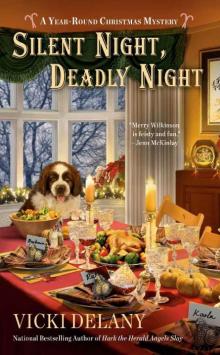 Silent Night, Deadly Night
Silent Night, Deadly Night Coral Reef Views
Coral Reef Views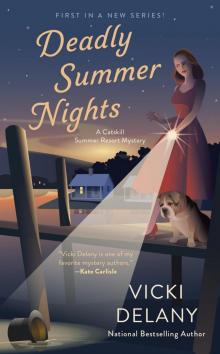 Deadly Summer Nights
Deadly Summer Nights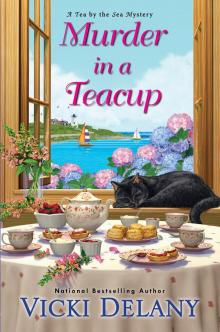 Murder in a Teacup
Murder in a Teacup Whiteout
Whiteout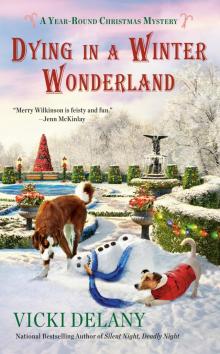 Dying in a Winter Wonderland
Dying in a Winter Wonderland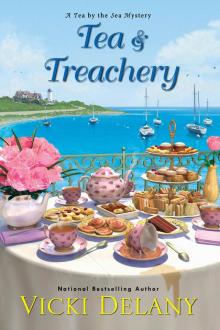 Tea & Treachery
Tea & Treachery Rest Ye Murdered Gentlemen
Rest Ye Murdered Gentlemen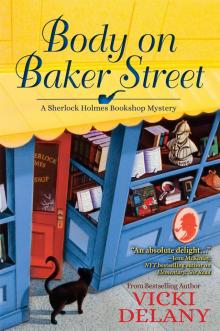 Body on Baker Street: A Sherlock Holmes Bookshop Mystery
Body on Baker Street: A Sherlock Holmes Bookshop Mystery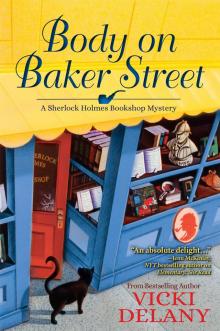 Body on Baker Street
Body on Baker Street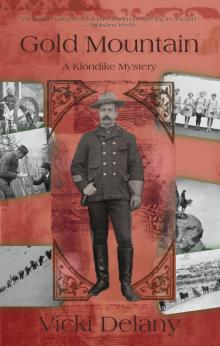 Gold Mountain
Gold Mountain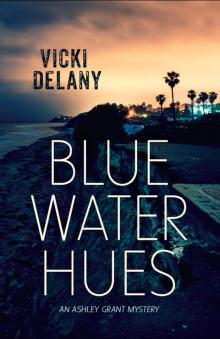 Blue Water Hues
Blue Water Hues Hark the Herald Angels Slay
Hark the Herald Angels Slay Murder at Lost Dog Lake
Murder at Lost Dog Lake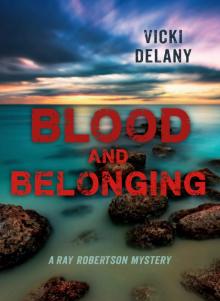 Blood and Belonging
Blood and Belonging A Winter Kill
A Winter Kill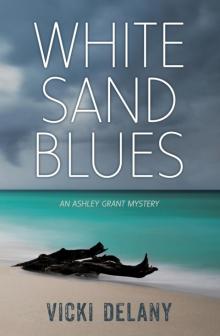 White Sand Blues
White Sand Blues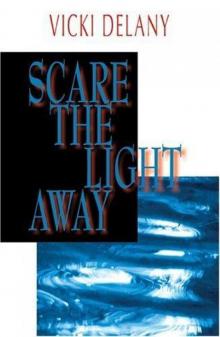 Scare the Light Away
Scare the Light Away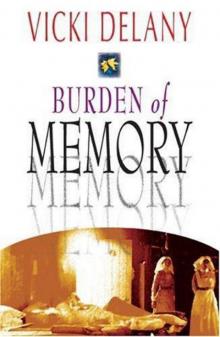 Burden of Memory
Burden of Memory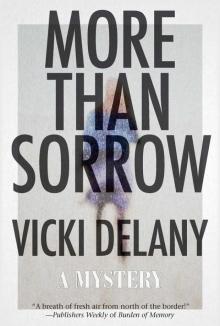 More Than Sorrow
More Than Sorrow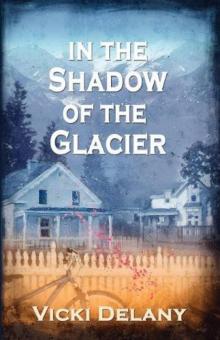 In the Shadow of the Glacier
In the Shadow of the Glacier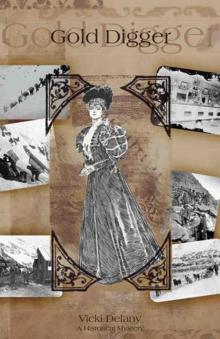 Gold Digger: A Klondike Mystery
Gold Digger: A Klondike Mystery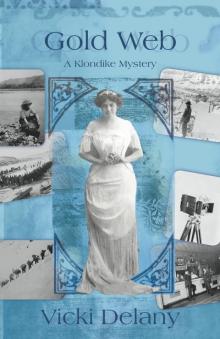 Gold Web
Gold Web Haitian Graves
Haitian Graves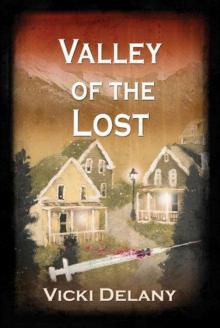 Valley of the Lost
Valley of the Lost We Wish You a Murderous Christmas
We Wish You a Murderous Christmas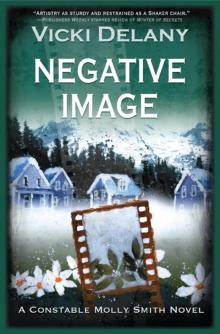 Negative Image
Negative Image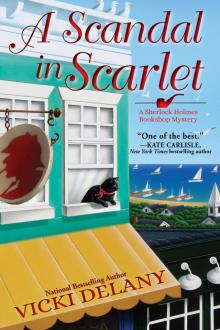 A Scandal in Scarlet
A Scandal in Scarlet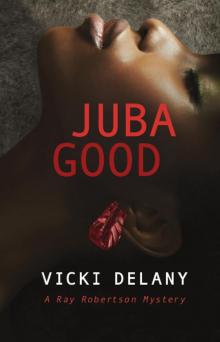 Juba Good
Juba Good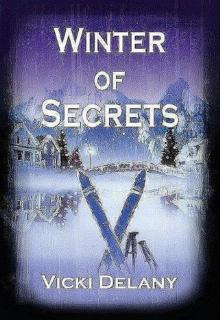 Winter of Secrets
Winter of Secrets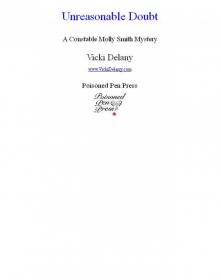 Unreasonable Doubt
Unreasonable Doubt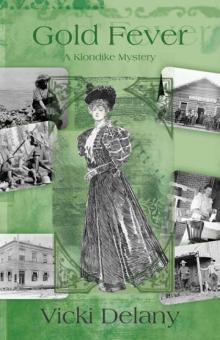 Gold Fever
Gold Fever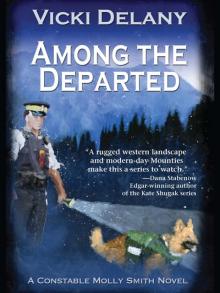 Among the Departed
Among the Departed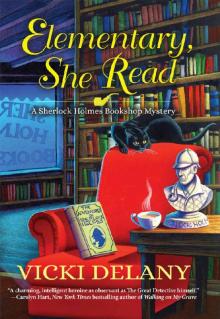 Elementary, She Read: A Sherlock Holmes Bookshop Mystery
Elementary, She Read: A Sherlock Holmes Bookshop Mystery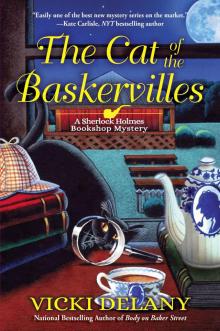 The Cat of the Baskervilles
The Cat of the Baskervilles